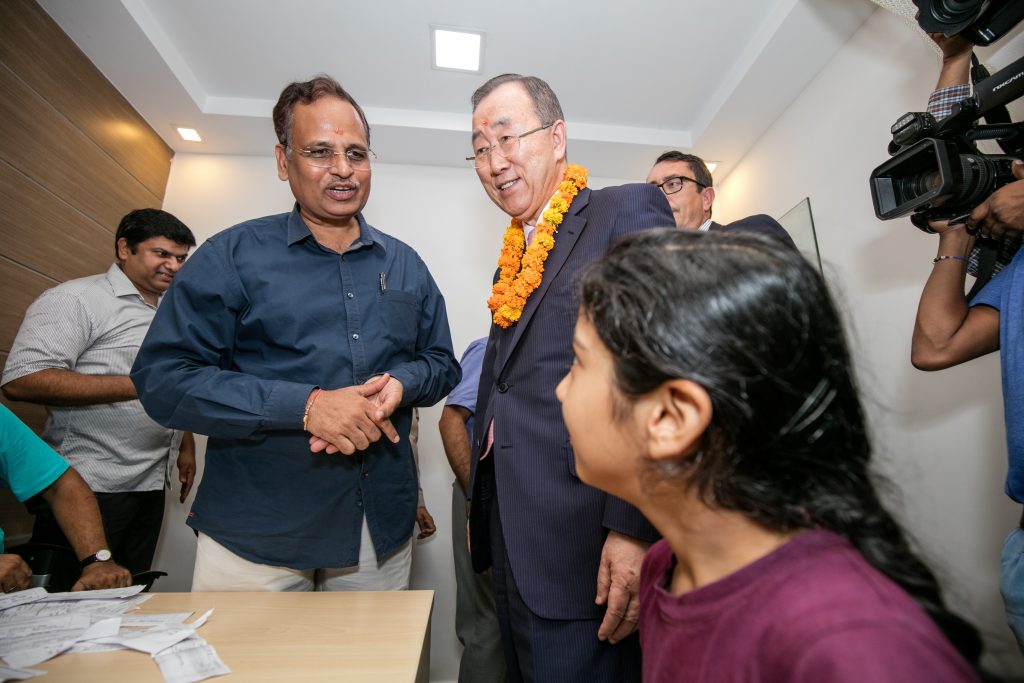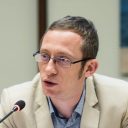Philanthropy has a long tradition of funding health services and research. In the wake of Covid-19, it needs to play an equally strong part in ensuring fair access to healthcare
Covid-19 has exposed the acute vulnerabilities of our deeply interconnected, globalised world. No country, regardless of its size, wealth or technological sophistication, can tackle this crisis alone. Unfortunately, we are still in the early stages of this pandemic. Beyond the direct health effects, the economic impacts will be both long-lasting and severe, with ripple effects for many fragile and conflict-affected states in the developing world which will potentially disrupt trade flows, damaging regional stability and prompting further mass migration.

Ban Ki-moon at a ‘Mohalla Clinic’ in Delhi. Photo: Hemant Chawla/The Elders
Public finances across the world are coming under severe strain, and the prospect of mass unemployment threatens an even greater burden on the public purse as well as a terrible blow to individuals’ life chances and the wealth of their communities.
Only through publicly-funded universal health coverage can we build the necessary resilience of health systems and healthy populations to withstand future pandemics.
At the same time, Covid-19 has exacerbated global economic and social inequalities. Poor and marginalised communities including migrants, ethnic minorities and Indigenous peoples have suffered disproportionately in terms of deaths and impoverishment, while recent research from Swiss bank UBS has highlighted that global billionaires’ wealth actually rose by 27.5 per cent between April and July 2020 to a record high of $10.2 trillion.[1]
In this challenging context, the role of philanthropy in supporting comprehensive, just and sustainable solutions to public health and funding crises is more important than ever.
Philanthropy has a long and distinguished history in supporting developments in health and healthcare, including providing access to vital services for the poor and vulnerable, from the establishment of the world’s first incorporated charity by Captain Thomas Coram in 18th-century London to care for abandoned infants, to the Rockefeller Foundation in the United States.
Philanthropy has also played a major role in funding scientific research in the world’s universities and research institutes, which has produced many of the medicines and technologies that have contributed to huge advances in medicine in the last 100 years.
For far too long, public health has been the poor relation of hospital services – this imbalance needs to be rectified as a priority.
This has resulted in unprecedented improvements in human and animal health, and is a trend that continues today as philanthropic money from groups such as the Wellcome Trust and Gates Foundation funds research into Covid-19 treatments and vaccines.
Equitable distribution of healthcare benefits
But in addition to funding services and research that increase the supply of effective health services, philanthropy can and should play a major role in ensuring that the benefits of advances in medicine are distributed equitably around the world, and in particular that they reach the poor and vulnerable.
These principles are enshrined in the Sustainable Development Goal (SDG) target of universal health coverage which every country has committed themselves to achieve by 2030.
I was proud to oversee the adoption of the SDGs when I was secretary-general of the United Nations, and remain convinced today that only through publicly-funded universal health coverage can we build the necessary resilience of health systems and healthy populations to withstand future pandemics.
Free at point of delivery
As part of moves towards Universal Health Coverage (UHC), countries should remove health service user fees and ensure that everyone can access services free at the point of delivery. Philanthropists who fund health services in the developing world can amplify this message to heads of state and policymakers when discussing their funding priorities.
Removing financial barriers to health services is particularly important in the midst of a pandemic, especially for disadvantaged groups such as women, children and the elderly.
Whilst philanthropic health financing is extremely valuable, the essential step to achieving UHC is when countries switch to a publicly-financed health system based on collective solidarity. Philanthropists and the sector can complement the state but they cannot replace it.
Furthermore, a large proportion of additional resources should be spent on primary healthcare services, including on vital public health services, which must be better integrated within overall UHC reforms. For far too long, public health has been the poor relation of hospital services – this imbalance needs to be rectified as a priority.
Within this framework, there are some excellent examples of foundations and philanthropists using their resources to improve access to services for vulnerable populations; for example the public health programme of Open Society Foundations who ‘support communities that receive substandard care or face barriers to services because of who they are’.
But whilst philanthropic health financing is extremely valuable, the essential step to achieving UHC is when countries switch to a publicly-financed health system based on collective solidarity. Philanthropists and the sector can complement the state but they cannot replace it. As we have seen throughout 2020 as the world grapples with this pandemic, democratic accountability and transparency are essential to retain public trust and confidence in the health system.
…and pay your taxes!
Philanthropists can play their part to strengthen the system by deploying their considerable resources to specific areas of research and development when public finances are stretched, but more importantly they can commit to paying their fair and full share of taxes in their home countries and not exploit loopholes or offshore schemes.
The Patriotic Millionaires group offer a salutary example for other wealthy global citizens to follow, with their affirmation that ‘taxes are the best and only appropriate way to ensure adequate investment in the things our societies need’.
The coronavirus pandemic has taught us all that we are only as strong as the weakest link in our human chain. But as we face the future, I am confident that the innovation, dynamism and public-spiritedness of modern philanthropy can help ensure that we can all emerge strengthened to build back better.
Ban Ki-moon is deputy chair of The Elders and served as secretary-general of the United Nations from 2007 to 2016.
Email: media@theelders.org
Twitter: @theelders
Footnotes
- ^ tinyurl.com/UBS-billionaires-report







Comments (0)